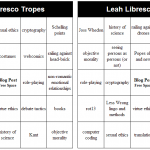This isn’t a standalone post, just a text-heavy footnote to a discussion with readers about the intended tone of the blog.
Original:
I have been an outspoken atheist for most of my life, so I wouldn’t have guessed I’d end up with a devoutly Catholic boyfriend in college. Needless to say, we’ve had plenty of discussions about our beliefs, and we’ve are still in profound disagreement.
During one discussion, I pressed him to name something that could serve as a disproof of Catholicism. He named the historicity of Jesus as messiah. If convincing historical evidence emerged that Jesus had never lived or that the Resurrection was a scam, he would be forced to give up his faith.
Then he turned the question on me. What would I accept as proof of Christianity?
And I paused.
The trouble was, I could I imagine events that could convince me to believe in the supernatural (though obviously, living in the age of Penn and Teller has raised the bar for evidence). However, a God that could clear that hurdle still had a lot to prove. Evidence of power is not equivalent to evidence of goodness or love. The most I could conceive of believing in was a kind of poltergeist, that could compel obedience by force, but was not loved.
So I put the burden on my boyfriend. I agreed I’d read anything, try anything (within reason) that he thought would convince me. Dozens of weekly Masses, a shelf of books, and one experiment with prayer later, I’m still a pretty confident atheist.
I’ve started this blog both as an opportunity to strengthen my arguments against religion, by engaging with other atheists, and as a way to keep being pushed by Christians. I’m in this argument to win, and I don’t want to shirk any challenge.
Version 2.0
I have been an outspoken atheist for most of my life, so I wouldn’t have guessed I’d end up with a devoutly Catholic boyfriend in college. Needless to say, we’ve had plenty of discussions about our beliefs, and we’ve are still in profound disagreement.
During one discussion, I pressed him to name something that could serve as a disproof of Catholicism. He named the historicity of Jesus as messiah. If convincing historical evidence emerged that Jesus had never lived or that the Resurrection was a scam, he would be forced to give up his faith.
Then he turned the question on me. What would I accept as proof of Christianity?
And I paused. And came up with bupkis.
I can imagine evidence that would convince me to believe in the supernatural or, that at the very least, human understanding of the laws of nature was deeply flawed, but that’s a long way from being able to believe in a personal God who loves me. I’ve given it some more thought since then, but, for the most part, I’m still at a loss.
Instead, I turned the burden back on my boyfriend. I offered to read anything, try anything (within reason) that he thought would convince me. After dozens of weekly Masses, conversations with priests and deacons, a shelf-full of books, one experiment with prayer, and RCIA classes starting this fall, I’m still a pretty confident atheist.
I’ve started this blog both as an opportunity to strengthen my arguments against religion, by engaging with other atheists, and as a way to keep being pushed on my principles by Christians. The only thing I want more than for my boyfriend and I to eventually end up on the same side is to make sure we land on the right one. Thanks to all the commenters for keeping me on my toes.
And (after another discussion), Version 3.0:
I was raised by in a non-religious household on Long Island, so I didn’t meet any outspoken Christians in real life until I went to college. I had seen people like Jerry Falwell on TV, but my community was so isolated from religion that, when we learned about the Reformation in AP European History, one student raised his hand to ask if Lutherans still existed.
When I went to college, and started hanging out with a politics and philosophy debating group, I met smart Christians for the first time, and it was a real shock. My idea of a Christian was the Young Earth Creationists, and now I was meeting people who not only were converts to Russian Orthodoxy and math majors, but they thought the beauty of mathematics was evidence for God. I still thought my new friends were wrong about the existence of God, but I had to recognize I’d been pretty wrong why they believed what they did. And if I hadn’t really understood their arguments in the past, it was only prudent to give them a second hearing.
And then I started dating one of these smart Christians. We knew that religion could be a pretty big impediment to our relationship (the title of this blog comes 2 Corinthians 6:14“Do not be unequally yoked with unbelievers”). We ended up making a deal: I’d go to Mass every week with him, and he’d go to ballroom dance class with me. And we both recommended books or blogs to each other that fueled our all-night debates.
He gave me Lewis and Chesterton (I’ve got an apologetics bookshelf, now), and I kept having trouble finding books to pass back. A lot of atheists are focused on rebutting evangelicals –after all, they tend to be the biggest political threat — but I had more trouble finding people who address the more sophisticated ideas. Atheism spends a lot of time playing defense, so I had even more trouble finding books and blogs talking about what we should believe instead of what we reject.
So I started this blog to try and crowdsource my arguments and to find more people to ask me tough questions and force me to burn off the dross in my philosophy. I talked with deacons, priests, and Dominicans and attended RCIA classes (until I got kicked out). Neither my boyfriend or I looked likely to switch teams in the near future, and, after two years of dating, we were at the point where a relationship that was incompatible with marriage seemed foolish, so, regretfully, we had to split up.
I hadn’t changed my mind about the existence of God, but here are some things that arguing with people on the internet and in real life has convinced me I was wrong about: I’m now in favor of covenant marriage, I’ve abandoned my former commitment to stoicism, and I think some forms of Christianity are internally consistent and even attractive.
I just still don’t think they’re true.
I’m still seriously exploring Christian claims, especially as atheists and Christians have ganged up to tell me that some of my beliefs (objective morality, teleological sympathies, transhumanism that bears a passing resemblance to Gnosticism) logically imply the existence of a God, and probably a Christian one. So I look at Aquinas and Augustine to see if they’re right, and I post about my best understanding of ethics and metaphysics so people can call me on my errors and be swayed by what I get right.
On this blog, I try and skip past the normal scripts and have the weird arguments. You can go somewhere else on the internet to find Christians who rely on Leviticus to explain why they disapprove of gay marriage, and don’t understand that the people they talk to don’t accept the bible as authoratative. The Christian who guest-posted here for a debate on gay marriage wanted to talk about the importance of having friendships that you know will never be sexually charged. (Other guest posters welcome!)
The one thing I’m certain of after a couple years of blogging about religion is that a lot of our arguments are unproductive because we don’t understand what the other side is saying. I set up an Ideological Turing Test, where atheists and Christians see if they can imitate each other well enough to pass for each other, and we found a lot of misconceptions and misunderstandings on both sides.
So welcome to the conversation. Play nice, but play to win. And don’t be afraid to show your hand. If you’re doing someone a service by pointing out their errors, be grateful when someone catches you out in one.















